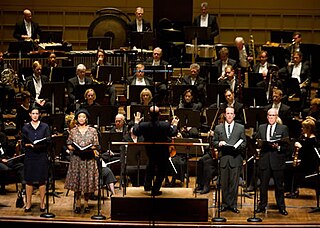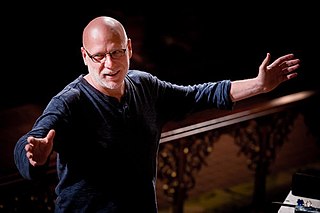Related Research Articles
EXPO is an orchestral composition by the Finnish composer Magnus Lindberg. It was the first work commissioned by the New York Philharmonic under the conductor Alan Gilbert, and was Lindberg's first commission as the orchestra's composer-in-residence. The piece was first performed on September 16, 2009 at Avery Fisher Hall, New York City, during Alan Gilbert's inaugural concert with the New York Philharmonic. EXPO was the first newly commissioned work to open the New York Philharmonic's concert season since the premiere of Aaron Copland's Connotations under Leonard Bernstein on September 23, 1962.

The Triangle Shirtwaist Factory fire in the Greenwich Village neighborhood of Manhattan, New York City, on Saturday, March 25, 1911, was the deadliest industrial disaster in the history of the city, and one of the deadliest in U.S. history. The fire caused the deaths of 146 garment workers – 123 women and girls and 23 men – who died from the fire, smoke inhalation, falling, or jumping to their deaths. Most of the victims were recent Italian or Jewish immigrant women and girls aged 14 to 23; of the victims whose ages are known, the oldest victim was 43-year-old Providenza Panno, and the youngest were 14-year-olds Kate Leone and Rosaria "Sara" Maltese.

Julia Wolfe is an American composer and professor of music at New York University. According to The Wall Street Journal, Wolfe's music has "long inhabited a terrain of its own, a place where classical forms are recharged by the repetitive patterns of minimalism and the driving energy of rock". Her work Anthracite Fields, an oratorio for chorus and instruments, was awarded the 2015 Pulitzer Prize for Music. She has also received the Herb Alpert Award (2015) and was named a MacArthur Fellow (2016).

On the Transmigration of Souls is a composition for orchestra, chorus, children's choir, and pre-recorded tape by the American composer John Adams. It was commissioned by the New York Philharmonic and Lincoln Center's Great Performers shortly after the September 11 terrorist attacks of 2001. Adams began writing the piece in late January 2002, and the music was premiered by the New York Philharmonic on September 19, 2002, at Avery Fisher Hall. The work is composed in a single movement and has a duration of approximately 25 minutes. Pre-recorded voices, increasingly distorted, list the names of some of the victims, followed by the word “Missing” after each name. The work's sheet music is published by Boosey & Hawkes.

Steven Edward Stucky was a Pulitzer Prize-winning American composer.

Symphony No. 3 "Kaddish" is a programmatic choral symphony by Leonard Bernstein, published in 1963. It is a dramatic work written for a large orchestra, a full choir, a boys' choir, a soprano soloist and a narrator. "Kaddish" refers to the Jewish prayer that is chanted at every synagogue service for the dead but never mentions "death."
Christopher Chapman Rouse III was an American composer. Though he wrote for various ensembles, Rouse is primarily known for his orchestral compositions, including a Requiem, a dozen concertos, and six symphonies. His work received numerous accolades, including the Kennedy Center Friedheim Award, the Grammy Award for Best Classical Contemporary Composition, and the Pulitzer Prize for Music. He also served as the composer-in-residence for the New York Philharmonic from 2012 to 2015.

The New York shirtwaist strike of 1909, also known as the Uprising of the 20,000, was a labour strike primarily involving Jewish women working in New York shirtwaist factories. It was the largest strike by female American workers up to that date. Led by Clara Lemlich and the International Ladies' Garment Workers' Union, and supported by the National Women's Trade Union League of America (NWTUL), the strike began in November 1909.
David Bruce is a British composer and a YouTuber.

Donald Nally is an American conductor, chorus master, and professor of conducting, specializing in chamber choirs, opera, and new music. He is conductor of the professional new-music choir, The Crossing, based in Philadelphia. He teaches graduate students at Northwestern University's Bienen School of Music.

The Crossing is an American professional chamber choir, conducted by Donald Nally and based in Philadelphia, Pennsylvania. It focuses on new music, commission and premiere works, and collaborates with various venues and instrumental ensembles.
Rhapsodies for Orchestra is a single-movement orchestral composition by the American composer Steven Stucky. The work was jointly commissioned by the New York Philharmonic and the BBC for the Philharmonic's European tour in August and September 2008. The piece had its world premiere August 28, 2008 in Royal Albert Hall at The Proms, with the New York Philharmonic performing under conductor Lorin Maazel.
The Piano Concerto No. 2 is a composition for solo piano and orchestra by the Finnish composer Magnus Lindberg. The work was jointly commissioned by the Royal Concertgebouw Orchestra, the Gothenburg Symphony Orchestra, and the New York Philharmonic, for which Lindberg was then composer-in-residence. It was given its world premiere at Avery Fisher Hall on May 3, 2012 by the pianist Yefim Bronfman and the New York Philharmonic under the direction of Alan Gilbert.
America: A Prophecy (sometimes stylized as America (A Prophecy)) is a composition for mezzo-soprano and orchestra with an optional chorus by the British composer Thomas Adès. The work was commissioned by the New York Philharmonic with financial contributions from the Francis Goelet Fund. It was given its world premiere by the mezzo-soprano Beth Clayton, the Westminster Symphonic Choir, and the New York Philharmonic under the direction of Kurt Masur at Avery Fisher Hall on November 11, 1999.
Al largo is a composition for orchestra by the Finnish composer Magnus Lindberg. It was commissioned by the New York Philharmonic while Lindberg served as the orchestra's composer-in-residence. Its world premiere was given by the New York Philharmonic under the direction of Alan Gilbert at Avery Fisher Hall on June 23, 2010.
Unearth, Release is a viola concerto by the American composer Julia Adolphe. The work was commissioned by the League of American Orchestras and the New York Philharmonic with support from the Virginia B. Toulmin Foundation. It was first performed on July 16, 2016, at Guilford College by the violist Cynthia Phelps and Eastern Music Festival Orchestra under Gerard Schwarz. Adolphe later revised the work, however, and the revised version was given its premiere on November 17, 2016, at David Geffen Hall by Phelps and the New York Philharmonic conducted by Jaap van Zweden. Adolphe dedicated the piece Cynthia Phelps and the New York Philharmonic.
Tread softly is a composition for orchestra by the American composer Nina C. Young. The work was commissioned by the New York Philharmonic as the first part of their "Project 19," an initiative commissioning new works by 19 female composers in honor of the centennial of the ratification of the Nineteenth Amendment to the United States Constitution. It was first performed by the New York Philharmonic under the direction of Jaap van Zweden at David Geffen Hall on February 5, 2020.
When the World as You've Known It Doesn't Exist is a composition for three sopranos and orchestra by the American composer Ellen Reid. The work was commissioned by the New York Philharmonic as part of its "Project 19," an initiative commissioning new works by 19 female composers in honor of the centennial of the ratification of the Nineteenth Amendment to the United States Constitution. It was first performed by the sopranos Eliza Bagg, Martha Cluver, and Estelí Gomez and the New York Philharmonic under the direction of Jaap van Zweden at David Geffen Hall on February 20, 2020.
Stride is an orchestral composition by the Cuban-American composer Tania León. The work was commissioned by the New York Philharmonic and the Oregon Symphony as part of the New York Philharmonic's "Project 19," an initiative commissioning new works by 19 female composers in honor of the centennial of the ratification of the Nineteenth Amendment to the United States Constitution. It was first performed by the New York Philharmonic under the direction of Jaap van Zweden in David Geffen Hall, New York City, on February 13, 2020. The piece is dedicated “In honor of Susan B. Anthony and to the visionaries Deborah Borda and Jaap van Zweden." The piece was awarded the 2021 Pulitzer Prize for Music.
1920/2019 is an orchestral composition written by the American composer Joan Tower. The work was commissioned by the New York Philharmonic as part of "Project 19," an initiative commissioning new works by 19 female composers in honor of the centennial of the ratification of the Nineteenth Amendment to the United States Constitution. Its world premiere, though delayed by the COVID-19 pandemic, was given by the New York Philharmonic under the direction of Jaap van Zweden at Alice Tully Hall on December 3, 2021. The piece is dedicated to the New York Philharmonic president and CEO Deborah Borda "in recognition of her vision for the creation of Project 19."
References
- 1 2 Wolfe, Julia (2018). "Fire in my mouth". G. Schirmer Inc. Archived from the original on January 26, 2019. Retrieved February 10, 2019.
- ↑ Yuan, Elizabeth (January 23, 2019). "Philharmonic Piece Inspired by Triangle Shirtwaist Fire Set to Debut". The Wall Street Journal . Retrieved February 10, 2019.
- ↑ Cooper, Michael (January 22, 2019). "Arming a Chorus of Women With Scissors". The New York Times . Retrieved February 10, 2019.
- ↑ Stearns, David Patrick (January 21, 2019). "Montco's Pulitzer Prize-winning composer used two Philly churches to rehearse her big Lincoln Center premiere, opening Thursday". The Philadelphia Inquirer . Retrieved February 10, 2019.
- ↑ Tommasini, Anthony (January 25, 2019). "Review: With Protest and Fire, an Oratorio Mourns a Tragedy". The New York Times. Retrieved February 10, 2019.
- ↑ Hajdu, David (February 14, 2019). "Julia Wolfe's Haunting Elegy to the Triangle Shirtwaist Factory". The Nation . Retrieved February 18, 2019.
- ↑ Wright, David (January 25, 2019). "Wolfe's Philharmonic "Fire" premiere long on drama, short on meaning". New York Classical Review. Retrieved February 10, 2019.